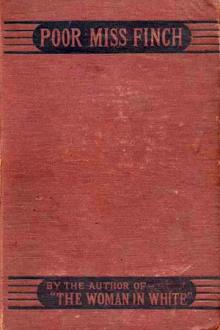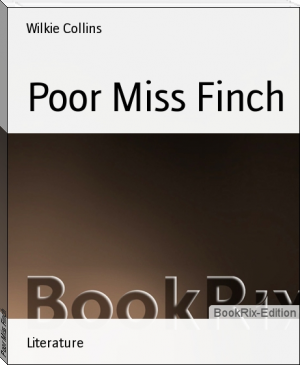Poor Miss Finch - Wilkie Collins (best books to read for beginners txt) 📗

- Author: Wilkie Collins
- Performer: -
Book online «Poor Miss Finch - Wilkie Collins (best books to read for beginners txt) 📗». Author Wilkie Collins
Both the brothers looked at me.
“Have you nothing to say, Madame Pratolungo?” asked Nugent.
Oscar was too painfully agitated to speak. He softly crossed to my chair; and, kneeling by me, put my hand entreatingly to his lips.
You may consider me a heartless woman if you will. I remained entirely unmoved even by this. Lucilla’s interests and my interests, you will observe, were now one. I had resolved, from the first, that she should not be married in ignorance of which was the man who was disfigured by the blue face. If she took the course which would enable her to make that discovery for herself, at the right time, she would spare me the performance of a very painful and ungracious duty—and she would marry, as I was determined she should marry, with a full knowledge of the truth. In this position of affairs, it was no business of mine to join the twin-brothers in trying to make her alter her resolution. On the contrary, it was my business to confirm her in it.
“I can’t see that I have any right to interfere,” I said. “In Lucilla’s place—after one and twenty years of blindness—I too should sacrifice every other consideration to the consideration of recovering my sight.”
Oscar instantly rose, offended with me, and walked away to the window. Lucilla’s face brightened gratefully. “Ah!” she said, “you understand me!” Nugent, in his turn, left his chair. He had confidently calculated, in his brother’s interests, on Lucilla’s marriage preceding the recovery of Lucilla’s sight. That calculation was completely baffled. The marriage would now depend on the state of Lucilla’s feelings, after she had penetrated the truth for herself. I saw Nugent’s face darken, as he walked to the door.
“Madame Pratolungo,” he said, “you may, one day, regret the course that you have just taken. Do as you please, Lucilla—I have no more to say.”
He left the room, with a quiet submission to circumstances which became him admirably. Now, as always, it was impossible not to compare him advantageously with his vacillating brother. Oscar turned round at the window, apparently with the idea of following Nugent out. At the first step he checked himself. There was a last effort still left to make. Reverend Finch’s “moral weight” had not been thrown into the scale yet.
“There is one thing more, Lucilla,” he said, “which you ought to know before you decide. I have seen your father. He desires me to tell you that he is strongly opposed to the experiment which you are determined to try.”
Lucilla sighed wearily. “It is not the first time that I find my father failing to sympathize with me,” she said. “I am distressed—but not surprised. It is you who surprise me!” she added, suddenly raising her voice. “You, who love me, are not one with me, when I am standing on the brink of a new life. Good Heavens! are my interests not your interests in this? Is it not worth your while to wait till I can look at you when I vow before God to love, honor, and obey you? Do you understand him?” she asked, appealing abruptly to me. “Why does he try to start difficulties? why is he not as eager about it as I am?”
I turned to Oscar. Now was the time for him to fall at her feet and own it! Here was the golden opportunity that might never come again. I signed to him impatiently to take it. He tried to take it—let me do him the justice now, which I failed to do him at the time—he tried to take it. He advanced towards her; he struggled with himself; he said, “There is a motive for my conduct, Lucilla–-” and stopped. His breath failed him; he struggled again; he forced out a word or two more: “A motive,” he went on, “which I have been afraid to confess–-” he paused again, with the perspiration pouring over his livid face.
Lucilla’s patience failed her. “What is your motive?” she asked sharply.
The tone in which she spoke broke down his last reserves of resolution. He turned his head suddenly so as not to see her. At the final moment—miserable, miserable man!—at the final moment, he took refuge in an excuse.
“I don’t believe in Herr Grosse,” he said faintly, “as you believe in him.”
Lucilla rose, bitterly disappointed, and opened the door that led into her own room.
“If it had been you who were blind,” she answered, “your belief would have been my belief, and your hope my hope. It seems I have expected too much from you. Live and learn! live and learn!”
She went into her room, and closed the door on us. I could bear it no longer. I got up, with the firm resolution in me to follow her, and say the words which he had failed to say for himself. My hand was on the door, when I was suddenly pulled back from it by Oscar. I turned, and faced him in silence.
“No!” he said, with his eyes fixed on mine, and his hand still on my arm. “If I don’t tell her, nobody shall tell her for me.”
“She shall be deceived no longer—she must, and shall, hear it,” I answered. “Let me go!”
“You have given me your promise to wait for my leave before you open your lips. I forbid you to open your lips.”
I snapped the fingers of my hand that was free, in his face. “That for my promise!” I said. “Your contemptible weakness is putting her happiness in peril as well as yours.” I turned my head towards the door, and called to her. “Lucilla!”
His hand closed fast on my arm. Some lurking devil in him that I had never seen yet, leapt up and looked at me out of his eyes.
“Tell her,” he whispered savagely between his teeth; “and I will contradict you to your face! If you are desperate, I am desperate too. I don’t care what meanness I am guilty of! I will deny it on my honor; I will deny it on my oath. You heard what she said about you at Browndown. She will believe me before you.”
Lucilla opened her door, and stood waiting on the threshold.
“What is it?” she asked quietly.
A moment’s glance at Oscar warned me that he would do what he had threatened, if I persisted in my resolution. The desperation of a weak man is, of all desperations, the most unscrupulous and the most unmanageable—when it is once roused. Angry as I was, I shrank from degrading him, as I must now have degraded him, if I matched my obstinacy against his. In mercy to both of them, I gave way.
“I may be going out, my dear, before it gets dark,” I said to Lucilla. “Can I do anything for you in the village?”
“Yes,” she said, “if you will wait a little, you can take a letter for me to the post.”
She went back into her room, and closed the door.
I neither looked at Oscar, nor spoke to him, when we were alone again. He was the first who broke the silence.
“You have remembered your promise to me,” he said. “You have done well.”
“I have nothing more to say to you,” I answered. “I shall go to my own room.”
His eyes followed me uneasily as I walked to the door.
“I shall speak to her,” he muttered doggedly, “at my own time.”
A wise woman would not have allowed him to irritate her into saying another word. Alas! I am not a wise woman—that is to say, not always.
“Your own time?” I repeated with the whole force of my contempt. “If you don’t own the truth to her before the German surgeon comes back, your time will have gone by for ever. He has told us in the plainest terms—when once the operation is performed, nothing must be said to agitate or distress her, for months afterwards. The preservation of her tranquillity is the condition of the recovery of her sight. You will soon have an excuse for your silence, Mr. Oscar Dubourg!”
The tone in which I said those last words stung him to some purpose.
“Spare your sneers, you heartless Frenchwoman!” he broke out angrily. “I don’t care how I stand in your estimation. Lucilla loves me. Nugent feels for me.”
My vile temper instantly hit on the most merciless answer that I could make to him in return.
“Ah, poor Lucilla!” I said. “What a much happier prospect hers might have been! What a thousand pities it is that she is not going to marry your brother, instead of marrying you!”
He winced under that reply, as if I had cut him with a knife. His head dropped on his breast. He started back from me like a beaten dog—and suddenly and silently left the room.
I had not been a minute by myself, before my anger cooled. I tried to keep it hot; I tried to remember that he had aspersed my nation in calling me a “heartless Frenchwoman.” No! it was not to be done. In spite of myself, I repented what I had said to him.
In a moment more, I was out on the stairs to try if I could overtake him.
I was too late. I heard the garden-gate bang, before I was out of the house. Twice I approached the gate to follow him. And twice I drew back, in the fear of making bad worse. It ended in my returning to the sitting-room, very seriously dissatisfied with myself.
The first welcome interruption to my solitude came—not from Lucilla—but from the old nurse. Zillah appeared with a letter for me: left that moment at the rectory by the servant from Browndown. The direction was in Oscar’s handwriting. I opened the envelope, and read these words:—
“MADAME PRATOLUNGO,—YOU have distressed and pained me more than I can say. There are faults, and serious ones, on my side, I know. I heartily beg your pardon for anything that I may have said or done to offend you. I cannot submit to your hard verdict on me. If you knew how I adore Lucilla, you would make allowances for me—you would understand me better than you do. I cannot get your last cruel words out of my ears. I cannot meet you again without some explanation of them. You stabbed me to the heart, when you said to me this evening that it would be a happier prospect for Lucilla if she had been going to marry my brother instead of marrying me. I hope you did not really mean that? Will you please write and tell me whether you did or not?
“OSCAR.”
Write and tell him? It was absurd enough—when we were within a few minutes’ walk of each other—that Oscar should prefer the cold formality of a letter, to the friendly ease of a personal interview. Why could he not have called, and spoken to me? We should have made it up together far more comfortably in that way—and in half the time. At any rate, I determined to go to Browndown, and be good friends again, viva^-voce, with this poor, weak, well-meaning, ill-judging boy. Was it not monstrous to have attached serious meaning to what





Comments (0)